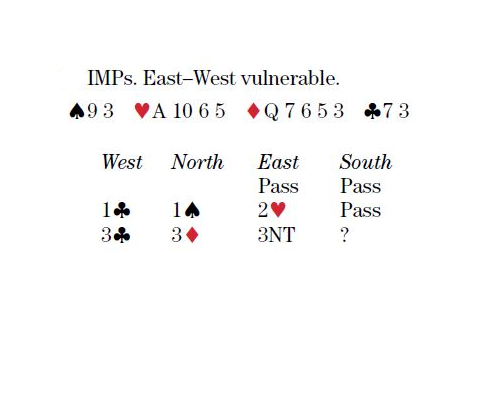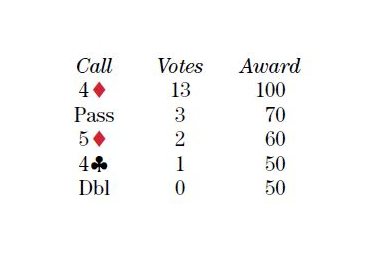
What’s your call?
| 4♣ | 4♦ | 4♥ | 4♠ | 4NT |
| 5♣ | 5♦ | 5♥ | 5♠ | 5NT |
| 6♣ | 6♦ | 6♥ | 6♠ | 6NT |
| 7♣ | 7♦ | 7♥ | 7♠ | 7NT |
| Dbl | Pass |
Save and save again
Most of the experts choose a simple raise to 4♦.
The Gordons use 4♦ to purchase “insurance at favorable vulnerability.”
“We believe the vulnerable opponents and think that we have a good save,” say the Joyces, who bid 4♦.
“Given the opposing bidding, partner seems more distributional than strong,” says Boehm. “Who knows? We may get doubled in 4♦.”
“I expect to beat 3NT, but will not hold out this excellent five-card support by passing or doubling,” says Stack. “I hope that partner will bid 5♦ with an appropriate hand.”
Sanborn, to the point: “4♦. No other choice.”
Longer-winded Falk visualizes: “The 3NT bid tells me we have a loser in each of partner’s suits, so partner rates to be 5–5 or 6–5 with something like:
♠K Q 10 x x ♥x ♦A J 10 x x ♣x x
and 4♦ is either making or down one, and 5♦ is down one. Meanwhile, it is close whether we can beat 3NT. I considered 4♣ as a way of inviting 5♦ and showing some values to help partner know what to do over 5♣, but the odds that partner has extras are very low, and I don’t want to make it clear to the opponents that I think 4♦ will have good play.”
“They might have nine winners if I pass or double 3NT,” Hampson says. “I have a great hand for partner now that he has diamonds also. I will try 4♦ and if I hear 5♣, I might try 5♦. This is unlikely to go down much and they might make 5♣. If partner is
5=3=5=0, we might even make this.”
“They rate to have eight tricks most of the time,” Lawrence points out. “I might double in hopes of getting 200 but that is likely to cause West to squirm back to 4♣. I would rather bid 4♦ now and let them make the last guess. This is probably an impossible auction. East made a non-forcing 2♥ bid. West bid 3♣, which is meaningless. He could just be running from hearts. Still, East is promising a diamond stopper and something in spades. Along with West’s good clubs, they do have a source of tricks.”
Declarer rates to have eight tricks in clubs and diamonds,” says Rigal, who bids 4♦. “Does declarer have the ♠A for a ninth winner? I’m not prepared to gamble that he doesn’t. If they bid to 5♣, I’ll gamble to pass — though maybe I should save again.”
Walker passes. “I don’t see us making 5♦, and I think we’re beating 3NT. I’m not sure enough to double, though, and I don’t want to scare them into running.”
Robinson leaps to 5♦. “I’m not sure how many club winners West has, so I can’t take the chance that they could make 3NT. I wouldn’t be happy defending 5♣ so I might as well bid 5♦.”
Cohen, too: “I could definitely be talked into 4♦ (walking the dog), later intending to bid 5♦ if need be. My style, though, is to bid to the limit the first time.”
Weinstein shows his appreciation of partner’s diamond bid with a club cuebid. “This is a 4½ diamond bid,” he explains. “If I had the same hand with a stiff spade, I would bid 5♦. Partner also heard East bid 3NT behind him.”

